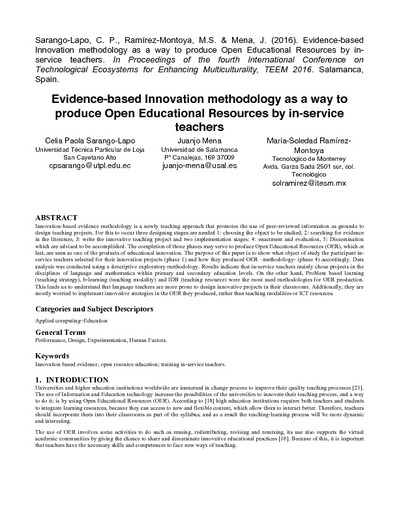| dc.contributor.author | Sarango Lapo, Celia P. | en |
| dc.contributor.author | Ramírez Montoya, María S. | en |
| dc.contributor.author | Mena Marcos, Juan J. | en |
| dc.date.accessioned | 2016-10-08T20:53:19Z | |
| dc.date.available | 2016-10-08T20:53:19Z | |
| dc.date.issued | 2016 | |
| dc.identifier.uri | http://hdl.handle.net/11285/620881 | |
| dc.description.abstract | Innovation-based evidence methodology is a newly teaching approach that promotes the use of peer-reviewed information as grounds to design teaching projects. For this to occur three designing stages are needed 1: choosing the object to be studied, 2: searching for evidence in the literature, 3: write the innovative teaching project and two implementation stages: 4: enactment and evaluation, 5: Dissemination which are advised to be accomplished. The completion of those phases may serve to produce Open Educational Resources (OER), which at last, are seen as one of the products of educational innovation. The purpose of this paper is to show what object of study the participant in-service teachers selected for their innovation projects (phase 1) and how they produced OER –methodology- (phase 4) accordingly. Data analysis was conducted using a descriptive exploratory methodology. Results indicate that inservice teachers mainly chose projects in the disciplines of language and mathematics within primary and secondary education levels. On the other hand, Problem based learning (teaching strategy), b-learning (teaching modality) and IDB (teaching resource) were the most used methodologies for OER production. This leads us to understand that language teachers are more prone to design innovative projects in their classrooms. Additionally, they are mostly worried to implement innovative strategies in the OER they produced, rather than teaching modalities or ICT resources. | |
| dc.format | En Extenso / In Extenso | en |
| dc.language.iso | eng | en |
| dc.relation | 266632-CONACYT-SENER-S0019201401 | en |
| dc.relation.url | https://2016.teemconference.eu/ | en |
| dc.rights.uri | http://creativecommons.org/licenses/by-nc-nd/4.0/ | * |
| dc.title | Evidence-based Innovation methodology as a way to produce Open Educational Resources by in-service teachers | en |
| dc.type | Artículo de Conferencia / Conference Article | |
| dc.conference.name | Fourth International Conference on Technological Ecosystems for Enhancing Multiculturality, TEEM 2016 | en |
| dc.conference.host | Universidad de Salamanca | en |
| dc.conference.location | Salamanca, Spain | en |
| dc.subject.keyword | Performance | en |
| dc.subject.keyword | Design | en |
| dc.subject.keyword | Experimentation | en |
| dc.subject.keyword | Human Factors. | en |
| dc.identifier.volume | 2016 | en |
| dc.contributor.affiliation | Tecnologico de Monterrey | en |
| dc.subject.discipline | Ciencias Sociales / Social Sciences | |
| refterms.dateFOA | 2016-12-01T00:00:00Z | |
| html.description.abstract | <p style="text-align:justify">Innovation-based evidence methodology is a newly teaching<br />approach that promotes the use of peer-reviewed information as<br />grounds to design teaching projects. For this to occur three<br />designing stages are needed 1: choosing the object to be studied,<br />2: searching for evidence in the literature, 3: write the innovative<br />teaching project and two implementation stages: 4: enactment and<br />evaluation, 5: Dissemination which are advised to be<br />accomplished. The completion of those phases may serve to<br />produce Open Educational Resources (OER), which at last, are<br />seen as one of the products of educational innovation. The<br />purpose of this paper is to show what object of study the<br />participant in-service teachers selected for their innovation<br />projects (phase 1) and how they produced OER –methodology-<br />(phase 4) accordingly. Data analysis was conducted using a<br />descriptive exploratory methodology. Results indicate that inservice<br />teachers mainly chose projects in the disciplines of<br />language and mathematics within primary and secondary<br />education levels. On the other hand, Problem based learning<br />(teaching strategy), b-learning (teaching modality) and IDB<br />(teaching resource) were the most used methodologies for OER<br />production. This leads us to understand that language teachers are<br />more prone to design innovative projects in their classrooms.<br />Additionally, they are mostly worried to implement innovative<br />strategies in the OER they produced, rather than teaching<br />modalities or ICT resources.</p> | |

